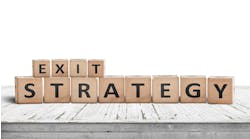Upsell your services and add margin dollars that could become big revenue for your shop
When you're in business and watching the bottom-line, you know the truth in the saying, "Every little bit helps." Add a lot of "little bits" together and you can be talking some real money – money that can help your collision center be more profitable.
Of course, one way to gain incremental dollars is to analyze your expenses and reduce them where you can. Another is to maximize bay and technician productivity; yet one has to factor the costs associated with marketing perhaps to keep those bays filled and technicians busy.
Another way to add incremental dollars to the bottom line is to raise shop labor rates and/or parts markups, but in this highly competitive business those probably aren't the most prudent moves for a shop to make.
So how can a shop, perhaps already working full-tilt, add incremental dollars to the bottom line and how can it do so without serious capital, labor or marketing investments? You simply have to ask for the additional business! This additional business comes from other work that you help the customer identify beyond the needs that brought the consumer to your shop. It comes from asking to:- Repair other body dings, dents, corrosion or missing trim
- Replace broken lamp housings
- Remedy bumper rash
- Correct glass problems
- Detail the vehicle beyond expected cleanup levels
- Personalize a pickup truck with bedliner and accessory services
- Pick up the customers' vehicle with your own towing service
- And more
"The body shop business has gotten slow, here anyway, so the question is, how can you draw people into the shop and get more dollars?" asks Art Krolikowski, owner of Reedsburg Auto Body, Reedsburg, Wis. "So you start looking for other services to offer, like detailing, PDR, window tinting, undercoating, environmental protection packages and add-ons like edge moldings, running boards and mud flaps. People have a love affair with their cars."
What is upselling?
Asking for additional business is called upselling and upselling is what your estimators, intake and front-desk people should be doing with every customer — DRP or customer-pay. And often, taking the time to upsell a customer that should begin with a careful walkaround the vehicle as part of the intake, is the best liability insurance a collision center can have.
"Consumers wear different eyeglasses when they pick up their vehicle," notes Mike Quinn, president of 911 Collision Centers and AutoGlass, with five locations in Tucson, Ariz., and two in Las Vegas. "Why not protect yourself and your company from damages we often get blamed for? Let's make some money on those other damages by pointing them out to the consumer when we provide the estimate."Ed Kovalchick, president of fixed operations consultants Net Profit, Inc, Alabaster, Ga., agrees. "This is my take on upselling body shop services," advises Kovalchick. "Every vehicle that comes in with accident damage should have two estimates written."
The first is the primary estimate related to the accident damage. "Our goal in repairing the vehicle is to bring it back to like-new status, which is good except the rest of the car is aged," he says. Shops, therefore, should write a second estimate with the customer still there that covers all these other opportunities. "Too many estimators look at the wreck portion of the car and forget the rest of the vehicle," he says.Increase margins, add revenue
Admittedly, not every customer is going to bite at these other opportunities. Collision center operators interviewed for this article say upsell works as well with insurance customers as customer-pay customers, though higher deductibles for insurance work eats into those customers' pockets — money they might otherwise have given you for other ding repairs, a top-notch detailing or other upsell services.
"But there are a lot of opportunities that shops aren't grabbing," Quinn notes, "and it is up to us to make that initial step to ask. It's a rare customer who brings other work like this up first because they forget about it. Our goal is to drive the process and ask, 'While your vehicle is here, is there anything else we can do?' "
Upsell opportunities aren't homeruns, though. Some upsell work is more profitable than others. You should be able to mark-up the cost of a spoiler on an installation 30 percent to 40 percent, though there's not much wiggle room on labor, notes Kovalchick.
Detailing, too, affords some substantial margin opportunity — up to 40 percent. A $150 detail package should cost the shop about $60 in labor and materials.
Krolikowski estimates that on the customers his shop upsells, the additional sales add about 5 percent to the repair order dollar amount. Quinn estimates his shops upsell 10 percent to 15 percent of customers.
Again, you sometimes just have to ask or present those opportunities to your customers.
"There is no case in which I would not at least present a full detail package to the customer," Kovalchick advises. "I'd suggest to the customer that for another $80 (or whatever your price) you could buff the entire car and make it all look as good as the repaired area. You want to suggest to the customer that there is no point in him leaving your center with one portion of the car looking one way and the rest another way. Save the customer time and offer the convenience of your one-stop service."Barry Dorn, co-owner of Dorn's Body and Paint, Mechanicsville, Va., admits that individual upselling dollars aren't always large, but "can be a huge benefit at the end of the year."
Dorn though has set up separate "upsell" profit centers to capture more of the customer's auto-related business. He cross-sells customers to each center to be sure other identified needs stay with his businesses where he can capture those dollars rather than lose them to shops down the street.
For instance, he offers a full range of detailing services, a rust-proofing center and a mechanical repair center able to handle everything from engine work to brake pad replacement. The businesses are operated by 42 technicians, estimators, service writers and the like. About 80 percent of the detail shop business is from upselling collision customers. About 40 percent of mechanical center business results from collision center cross-sell. Most rust proofing is walk-in traffic.
Why the walkaround?
In mechanical shops, particularly those in franchised new car dealerships, the vehicle walkaround in the service lane is an essential step in every service write-up. Service writers equipped with laptop and printed schematics of vehicles walk around the vehicle with the customer, noting body damage, tire wear, glass condition, wiper life and the like. They then present the additional work opportunities to the customer."From a dealer's standpoint, this is where the money is," notes Kovalchick. "Dealers sell an awful lot of appearance and reconditioning dollars off the service lane, during the write-up and appraising condition of the car."
Dealerships do this to protect the company to be sure it is not purchasing dents and dings or broken glass that were already on the car when it came in for mechanical service. The second reason is to generate additional business through the observation process...some goes to the mechanical side, some to the body shop."Smart dealership body shop managers will have put in place an incentive program for the people in the service lane and pay them to not only identify body shop opportunities but to also present that as an upsell to the customer," he says. "Some body shop managers even go so far as providing training out of their own pockets to help these mechanical-side writers be better at upselling body shop services."
Trained to sell
It's not that your estimators and front-office people don't want your shop to make more money; they know on which side their bread is buttered. But too often they don't think to ask for the additional business, or if they do, feel pressured to complete the estimate or transaction and have the customer on his or her way.
In fact, one paint company business consultant we spoke to estimated that just 2 percent of front-line receptionists, body shop managers and estimators have had any formal sales training within the last few years. That's an appalling percentage, given that these are the people interacting with all the sales revenue that comes in."We've lost sight of how to sell and shops' reliance on DRPs has diminished the value of selling even more," the consultant notes. "We often think that if the insurers are sending their customers to us that the customer is going to buy from us; that's no guarantee of a sale like many of us would like to believe." That aside – or perhaps because of it – being able to read customers' openness to upsell opportunities is important.
"Some people will give you hints that they are not open to other opportunities," notes Dean Fields, manager at Wilmette Auto Body, Wilmette, Ill. "You need to be able to sense the customers' sense of hurry and then attend to the damages that brought their vehicle into you." You can politely ask if they want you to perform another service for them, but if they say, "No" don't push.
Is yours a money-maker culture?
A shop that seizes upsell opportunities is one whose culture embraces this money-maker. That culture starts with the attitude of the owner and operator.
"We drive a culture of understanding here that focuses all of us on taking care of all of the customers' needs," notes Quinn. "The key is training that helps staff understand why I want them to upsell and how to upsell and how to look for upsell opportunities. We see this culture as key to our customer satisfaction."
Such training is available through a number of resources, including consultants, associations and vendors, like your paint supplier.
"There's more to this than the walkaround and qualifying the customer," notes the paint supplier consultant. "A front-end selling system is required that focuses staff on identifying customer wants, needs and expectations, as well as additional opportunities. Unless you have this structured into your culture, your people are winging it, picking up additional work and dollars by accident.
"When that happens, the problem boils down to a lack of training. The staff does not qualify the customer for additional opportunities or believes the customer is only buying on the deductible and would never think of repairing other dents."
Don't give it away
And when a customer does mention fixing another minor dent or straightening headlamps, for instance, too many shops hear the question as a request for a freebie. "That's assumed due to their lack of professional selling skills," says the paint consultant, citing the example of one high-end collision center whose customers are architects, doctors and other well-heeled clients.
"The owner called stating his frustration with always being asked by his customers to perform additional work, hinting the shop should do the work for free, which he agreed to do," he recalls. "I asked him, 'Did you ever think to say, we'd be happy to write another estimate for that additional work and because it's being done at the same time as the collision work we can save you a little on time and materials.' " Once he took the new approach about 80 percent of those customers agreed to the customer-pay work.
In addition to giving estimators and office staff the skills and word-tracks for handling upsell opportunities, training can help people overcome their natural reluctance to talk about money. "A professional has no problem turning upselling into a benefit for the customer – convenience, retaining vehicle value, safety or image," he says.
As the saying goes, nothing happens until somebody sells something. Often, that's accomplished by simply asking the customer for the additional business.
TRY THESE UPSELL IDEAS
Upsell opportunities to the collision center customer are plentiful. And taking the effort to explain how upsell services can save a customer time – and money – is a good way to build customer satisfaction with your shop and keep customers coming back.
This focus on customer satisfaction has helped make 911 Collision Centers among the top 5 percent of collision repair providers in the United States and contributed to its receiving notable accolades as runner up in the Better Business Bureau's International "Ethics in Business" award and the American Automobile Association's (AAA's) "Top Shop" awards for service and repair excellence.
"How do you put a number on future business when it comes to treating customers well and building their trust for a lifetime?" asks Mike Quinn, president of 911 Collision Centers and AutoGlass. "The real story is how do you put a number on future sales when you help people out?"
For instance, he cites the example of a Honda brought to the shop for collision work by a young woman. Quinn noted that a wheel cover was missing and ordered a replacement for it at no charge to the customer.
"The woman's insurance agent called days later and relayed that the woman's father had called to say thanks for taking care of his daughter so well and replacing the wheel cover. That call meant a lot to that agent. He got a customer for life and I got an agent for life. How do you place a price tag on that?"
Plus, he adds, with insurers controlling more and more of how claims are handled, shop owners who want to grow their business need to look at growing their customer base. "I want to make sure I make the right impact on those customers – the ones I choose to come back to 911 Collision Centers. When you can develop raging fans, now that's upselling!"
Here are some other upsell ideas:
- Closers. Sometimes the upsell is the key to making the initial repair sale. Suppose a cracked tail lamp housing is noticed during a walkaround for a front-end collision estimate. You might suggest to the customer that while the vehicle is in your shop you could replace the housing, at a discount, to save the customer time and money. That might just be the closer that seals the deal, Quinn notes.
- Warranties. Insurers offer limited warranties on collision work. Yet most shops know the quality of their repairs and paint work will last a lifetime. Could you offer customers a three-year or longer warranty, that they purchase from you for a few hundred dollars?
- Towing. Market your towing services to local emergency departments and local advertising. Towing a vehicle involved in an accident to your collision center certainly increases the odds of that owner seeking an estimate from your facility. Towing services could provide other revenue opportunities as well.
- PDR. Quality paintless dent repair is a high skill. Many shops find subcontracting PDR to be more productive. It is another tool to enable your shop to offer customers more affordable alternatives.
- Glass Repair. Glass repair and installation is another specialty, especially windshield installation. Still, offering glass repair and installation helps customers view your business as a one-stop shop.
- Accessories. Parts margins can be 30 percent or more on accessories sold through your shop, plus labor charges. Selling and installing accessories helps customers personalize their vehicle. This can be an attractive upsell business for shops in markets of heavy light truck populations and tuners, especially.
- Environmental Packages. Whether paint, upholstery or glass protection services, these add-ons can make you money; often the margins are 100 percent or more.
- Bedliners. Nearly a quarter of all new pickup buyers will add a bedliner. The factories are getting into this business in a big way, but opportunity exists to capture some of this market and the market for older models. You can install a drop-in or spray bedliners yourself, or subcontract the work. Margins can be as much as 50 percent.
- Gift Certificates. Dorn's Body and Paint, Mechanicsville, VA, sells gift certificates as an upsell item. Recipients use the certificates for future business at the collision center and Dorn's reaps 100 percent of the certificate selling price upfront. "A surprising number of people want these certificates and it's money in our bank before the certificate is even used," says Co-Owner Barry Dorn.


